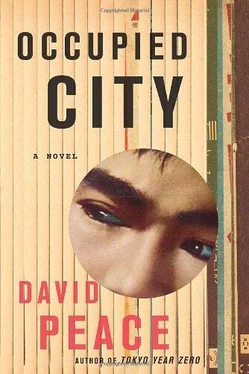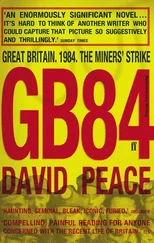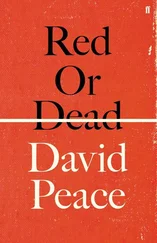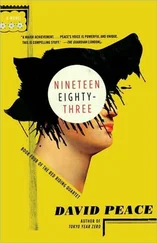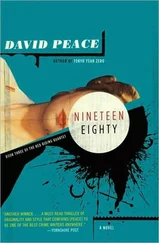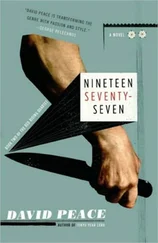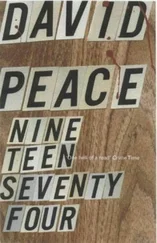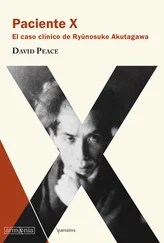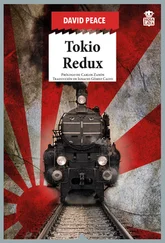In the Fictional City, I stop writing and I read what I have written. These letters in their grids. I stop reading. Now I get up from my desk, and I walk down the long, long table to my editor’s desk –
‘Ah, Takeuchi,’ smiles Ono. ‘What have you got for me today? Something meaty, I hope, something juicy …’
I hand him the paper. I say, ‘I think so.’
Ono sits back in his chair. He adjusts his glasses. He starts to read, nodding, nodding, nodding and now smiling, he says, ‘Great!’
‘Thanks,’ I say. ‘They’re denying it, of course …’
‘Of course,’ says Ono. ‘But that’s their problem. Not yours.’
IN THE FICTIONAL CITY, in the genkan to her house, she looks at the bunch of flowers in my hand, and she asks, ‘Why?’
‘The other day,’ I say. ‘It was a mistake. The coffee shop. I didn’t think. All those people. It was a bad idea …’
‘It wasn’t your fault,’ she says.
I hold out the flowers. I say, ‘Please. They are for you …’
She bows. She takes the flowers. She says, ‘Thank you.’
The door to her house closes now, locked again.
IN THE FICTIONAL CITY, among the stained-suits and the bad-skins, beneath the swing band and the reflecting lights, he hisses, ‘I was taking a big risk telling you the things I did, showing the documents I did. A big, big risk. And what for? For nothing. I read your so-called newspaper every day and every day I see nothing. Nothing about the SCAP connection, nothing about the Tsudanuma Arsenal. So it seems to me I took a big, big risk for nothing …’
‘Not exactly nothing,’ I tell him. ‘Yes, you took a risk, but you also took my cash. I paid you …’
‘Not enough. Not enough for the risk I took. So I want to know what’s happening, why I took a risk for nothing …’
‘I wrote the story,’ I tell him. ‘I gave it to my boss, he read it in front of me and he liked it, liked it very much …’
‘So where is it then, this story of yours, this story your editor says he liked, liked so very much?’
‘I don’t know,’ I say.
He stands up. He says, ‘Well, find out. Or you can forget about any more help, any more stories from me.’
IN THE FICTIONAL CITY, I stand before my editor’s desk at the head of the long, long table and I say, ‘Excuse me, Boss …’
‘Takeuchi,’ mutters Ono, not smiling. ‘What is it?’
‘Well, I’m sorry to disturb you,’ I say. ‘But I was wondering what had happened to that piece I wrote on the Poison School? You’d seemed very happy with it, you’d said you liked it, but…’
‘Yes,’ nods Ono. ‘I did like it. Very much …’
‘Thank you,’ I say. ‘But it hasn’t run yet…’
‘Not yet,’ says Ono. ‘Not been the time, not yet. Thought we’d wait and see if there was any statement from the MPB first. Maybe then get some quotes from them, flesh it out.’
‘I see,’ I say.
‘I’ve told you before,’ he tells me again. ‘In our business, you have to choose your time, pick your moment carefully. Don’t get me wrong, I like the story, like it very much and I’ll run it, I will. But in our business, there’s always a right time, always a wrong time to run a story. But that’s my job, my worry, not yours. So you just leave it with me, forget about it now, now you’ve done your bit, and you just get after the next one. Because there’s always a next one, isn’t there? Always another story, out there somewhere …’
IN THE FICTIONAL CITY, in a restaurant far from Shiinamachi, far from the scene of the crime, I ask her, ‘How is work? It must feel strange being back there at the bank now, after everything …’
‘Are you asking me as a reporter,’ she whispers, ‘or as a … As a what? What are you? Who are you, Mr Takeuchi?’
I look down at the table, the glass jar of toothpicks, the white bottle of soy sauce, and I say, ‘A friend, I hope …’
‘Then thank you,’ says Murata Masako. ‘I hope so, too.’
IN THE FICTIONAL CITY, a telephone rings, a voice whispers, along the wires, down the cables, with a time and with a place –
Down an alley, in a room, another room of shadows, another room of stares, another man hands me another envelope –
I open the envelope. I read its contents:
GENERAL HEADQUARTERS
SUPREME COMMANDER FOR THE ALLIED POWERS
Civil Intelligence Section, G-2
PUBLIC SAFETY DIVISION
APO 500
11 March 1948
Memorandum
SUBJECT: Teikoku Bank Robbery Case To: Mr H. S. Eaton, Chief Administrator, Police Branch
1. Interference by Japanese newspaper reporters with the police investigation of the Teikoku Bank Robbery case, as reported by Jiro Fujita, Chief of Detectives, Tokyo Metropolitan Police earlier on 11 March 1948 was discussed informally by Bryon Engle, Administrator in Charge, Police Branch, and this investigator; at 1100 hours this date with Major D. C. Imboden, OIC, Press and Publications Section.
2. In response to suggestions of PSD representatives, Major Imboden approved Mr Fujita’s projected press conference for the purpose of discussing the Teikoku case with Japanese newspaper executives in order that the problems created by interference of news reporters might be fully explained to the newsmen and for the purpose of soliciting the cooperation of the newspapers in halting such reported practices as reporters following suspects in the case and shadowing police investigators working on the case as well as reporters representing themselves to be detectives in order to secure news matter. Major Imboden advised Mr Engle at 1300 hours this date that telegraphic advice had been dispatched to all Japanese newspapers not to interfere with the police investigation in the Teikoku case or indulge in such practices as have been ascribed to the Tokyo reporters by Mr Fujita.
3. Major Imboden also stated that he would communicate personally with the publisher of the Yomiuri Shimbun in Tokyo and advise him to have his reporters removed immediately from their reported watch on the homes of persons working or secretly assisting in the investigation. He also said he would discuss the matter with Allied censorship authorities exercising control of Japanese publications and request the censors cooperate in stopping publication of any article containing any reference to the police investigation of a Japanese Army Poison School being connected with the Teikoku case; further he will request the censors screen all articles pertaining to the Teikoku case on the basis of whether publication of the article will hinder apprehension of the culprit.
JOHNSON F. MUNROE
Police Investigator
I stop reading. I put the document back in its envelope. I hand him back the envelope. I take out my wallet. I hand him the cash.
The man counts the cash. The man puts it in his jacket pocket. The man smiles and says, ‘Didn’t think you’d like it, but thought you should see it. Explains a lot doesn’t it?’
IN THE FICTIONAL CITY, days pass and stories pass; days of snow, days of wind, days of rain and days of sun, stories of food poisoning, stories of strikes, stories of cabinets resigning and stories of cabinets forming, the end of Katayama and the beginning of Ashida, as winter turns to spring, spring to summer, the sky falling and the temperature rising, as censorship turns to coercion, coercion to complicity in the Fictional City, where days pass and stories pass, days and stories passing in complicity and in columns until Sunday 22 August 1948, and a story, a story not in my paper, not in the Yomiuri —
A story in our rival paper, in the Mainichi:
Читать дальше
